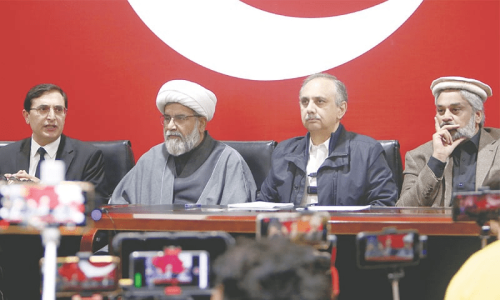• Forces continue to trade fire at LoC; checkpost in held-Kashmir destroyed after ‘unprovoked firing’
• India closes airspace for Pakistani planes until May 23; flights to GB cancelled for a few hours
• US Secy of State urges PM Shehbaz to help probe Pahalgam attack; tells New Delhi to work with Pakistan for de-escalation
ISLAMABAD: Amid a flurry of diplomatic activity aimed at calming tensions in the Subcontinent, fears of a possible military confrontation between India and Pakistan continued to persist on Wednesday.
Following a statement by Information Minister Atta Tarar in the early hours of Wednesday, where he warned of a possible incursion by India within the next 24-36 hours, a number of incidents of Indian aggression heightened tensions.
According to the Associated Press of Pakistan, Pakistani security forces delivered a robust response to India’s unprovoked ceasefire violation along the Line of Control (LoC), destroying an Indian checkpost after late-night aggression on April 29-30.
According to security officials, Indian troops resorted to unprovoked small arms fire in the Kiani and Mandal sectors, which was met with a prompt response.
Sources told APP that the retaliatory strikes destroyed several bunkers, including the Chakputra post in India-held Kashmir.
Reuters also reported that a conversation was held between top army officers from India and Pakistan — without naming them.
Separately, state media also reported that a “timely and swift response” by Pakistan Air Force (PAF) had forced four Indian Rafale jets to retreat.
Quoting security sources, state-run PTV and Radio Pakistan said that the previous night, four Indian Rafales were detected patrolling over the territory of held-Kashmir. A timely and prompt action by the PAF forced them to retreat.
They said that Indian jets became flustered and retreated owing to the PAF’s prompt response.
Airspace concerns
With tensions running high, Pakistan briefly closed the airspace over Gilgit-Baltistan, while India shut its airspace for all Pakistan-registered aircraft, or those owned and operated by Pakistani airlines or operators, including military craft.
A Notam (Notice to Airmen) issued by New Delhi said the closure would be from April 30 to May 23, 2025.
While PIA flights to the Gilgit and Skardu airports were cancelled on Wednesday, two Airblue flights between Skardu and Islamabad operated as per their schedule, sources said.
The PIA official noted that the air route between Gilgit-Baltistan and other cities passes “near Indian territories”.
However, the airspace closure ended after a few hours and flight schedules were restored.
One source told Dawn that the airspace closure was carried out due to certain exercises that were being carried out, but it was not clear if this was directly linked to the heightened tensions with India, or due to inclement weather, as rain and wind storms are predicted to sweep across the country’s northern parts from today.
Residents and visitors obviously faced difficulties, as alternative land routes are often less reliable and more time-consuming.
Diplomatic efforts
Meanwhile, the United States has urged both Pakistan and India to take steps to de-escalate tensions in the region.
US Secretary of State Marco Rubio conveyed the message in separate calls with Prime Minister Shehbaz Sharif and Indian External Affairs Minister S. Jaishankar.
In a readout of the call with PM Shehbaz, issued by the State Department, Spokesperson Tammy Bruce said: “The secretary spoke of the need to condemn the terror attack on April 22 in Pahalgam. Both leaders reaffirmed their continued commitment to holding terrorists accountable for their heinous acts of violence.”
“The Secretary urged Pakistani officials’ cooperation in investigating this unconscionable attack. He also encouraged Pakistan to work with India to de-escalate tensions, re-establish direct communications, and maintain peace and security in South Asia,” the statement said.
A separate readout of Rubio’s conversation with India’s foreign minister said: “[Secretary of State Marco Rubio] encouraged India to work with Pakistan to de-escalate tensions and maintain peace and security in South Asia.”
According to the Prime Minister’s Office, PM Shehbaz shared Pakistan’s perspective on recent developments in South Asia since the Pahalgam incident with Rubio.
During the call, the prime minister condemned terrorism in all its forms and manifestations, and termed India’s escalatory and provocative behavior as deeply disappointing and worrisome, adding that these would only distract Pakistan from its ongoing efforts to defeat terrorism.
He categorically rejected Indian attempts to link Pakistan to the incident and pointed to his call for a transparent, credible, and neutral investigation to bring out the facts.
He urged the US to impress upon India to dial down the rhetoric and act responsibly.
Meanwhile, Foreign Minister Ishaq Dar contacted leaders from European Union countries, apprising them that Pakistan was open to an transparent investigation into the Pahalgam attack.
Mr Dar spoke with Spanish Foreign Minister José Manuel Albares and Oman’s Foreign Minister Sayyid Badr bin Hamad bin Hamood Al Busaidi, briefing them on recent regional developments, including Indian propaganda and illegal unilateral measures against Pakistan, and placing Indus Waters Treaty in abeyance — a clear violation of international law.
He also met with US Chargé d’Affaires Natalie Baker, who called on the foreign minister in Islamabad. Both leaders exchanged views on recent regional developments, a statement said.
In the meeting, Mr Dar reaffirmed Pakistan’s commitment to regional peace and security while safeguarding national interests, while Ms Baker conveyed the US desire for de-escalation, adding that Washington would stay engaged with both countries on the evolving situation.
Jamil Nagri in Gilgit and Anwar Iqbal in Washington also contributed to this report
Published in Dawn, May 1st, 2025
















































